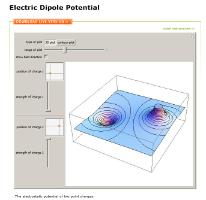World of maths and data comes to life through software
Published on 14 April, 2009
A CQUniversity mathematician is urging school teachers, university students and academics and even business people to think about using powerful software that can compute, analyze and present results swiftly...
"If you're doing anything technical, think Mathematica", is the advice from Dr Noel Patson, CQUniversity lecturer in computing sciences.
 Mathematica can not only be used for computation, but for modeling, simulation, visualization, development, documentation, and deployment.
Mathematica can not only be used for computation, but for modeling, simulation, visualization, development, documentation, and deployment.
According to its website, Mathematica is an integrated system that delivers unprecedented workflow, coherence, reliability, and innovation. Rather than different toolkits for different jobs, Mathematica has been built ground-up over nearly 20 years to deliver one vision: the ultimate technical application and environment.
It be can be used for and by primary school students and teachers to the world's leading researchers to show stunning visualizations of complex results or demonstrate subtle features of simple concepts. For the learner, Mathematica is a tool that visually stimulates cognition of the mundane to the sublime. For the researcher it is a vehicle to explore the immeasurable terrain of uncharted data be it financial, computational, educational or physical. Up to date databases of geographical, financial, chemical and genetic information (among others) are instantly available for analysis, synthesis and exploration.
The software can provide you access to a vast web of algorithms and knowledge and to link you to world class graphics immediately displaying data as colourful, manipulative and interactive displays. Mathematica understands music and can manipulate sounds in much the same way as any other data.
From computation to life sciences, from engineering to children's puzzles, Mathematica covers a vast range of applications.
See the breadth of work Mathematica can be used for via this link to a screencast.
"Mathematica could be used by a host of different people for different occasions. Within CQUniversity the software is definitely relevant to chemists, engineers, biologists and teachers - all staff and students could find some element in the software they could use," Dr Patson said.
Dr Patson is currently canvassing interest in the software with intentions of running workshops in the program later in the year. He will be running an introductory seminar on the capabilities of Mathematica for the Learning and Teaching Seminar Series at 1pm on Monday, May 18 in building 33/G.22.
He has over 100 free licenses available for academic and student use, so if you are interested in how Mathematica could be used in your academic field, contact Dr Patson on 4930 9027 or via n.patson@cqu.edu.au .

